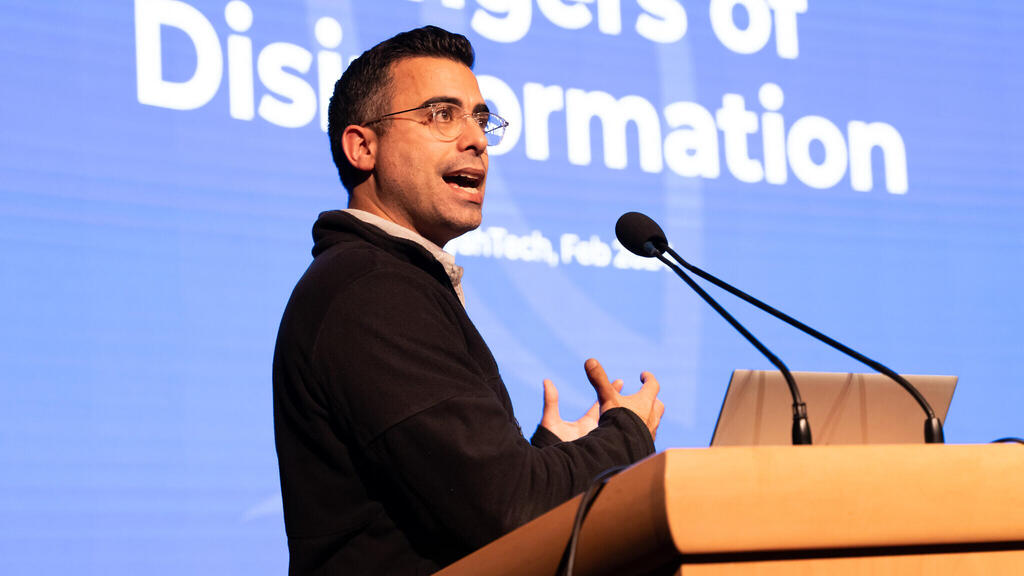When Israeli cyber intelligence startup Cyabra announced its intention to go public last month at a value of $70 million, it marked not only a significant milestone for the Israeli tech sector but also served as a sharp reminder to the world about the serious threat posed by disinformation – the deliberate spread of false or misleading information with the intention to deceive.
Cyabra is a disinformation security company that uses AI to uncover fake social media accounts. Elon Musk used it to expose Twitter fakes before he bought the online platform (and renamed it X).
Founded in 2017 by Dan Brahmy, Yossef Daar and Ido Shraga, all veterans of elite Israeli intelligence units, Cyabra’s AI platform identifies illicit bot campaigns and provides tools to combat the bad actors in the ongoing fight to restore trust in the digital realm. The company has supported 19 governments in protecting their elections over the past twelve months (at the time of writing).
“The timing is key,” says Rafi Mendelsohn, VP of marketing at Cyabra. “The fight against disinformation can’t wait any longer. There has been an exponential increase in disinformation and we have seen first-hand how disinformation can impact lives.
"The advancement of AI tools that are being used by malicious actors means that we need new tools to be able to tackle this head on and joining the public market firstly gives us access to capital and allows us to be able to scale our operations, activities, and understanding of what’s happening out there. It gives us a bigger platform to uncover misinformation that people should know about. The need is more crucial than ever.”
Quite. The World Economic Forum cites fake news as the “biggest short-term” threat, according to Global Risks Report 2024, while Gartner anticipates that by 2028, enterprise spending on battling malinformation will surpass $500 billion, cannibalizing 50 percent of marketing and cybersecurity budgets. \
The battle against misinformation has escalated to where 87 percent of executives say that the spread of disinformation is one of the most significant risks to businesses today, according to Global Research Center.
The damaging impact has been seen in the UK over recent weeks where misinformation fuelled riots over the stabbing attack in Southport that killed three children. Within hours of the attack, a false name of a supposed suspect was circulating on social media. Soon after, violent protesters were clashing with police outside a nearby mosque — the first of several violent protests taking place across England.
Mendelsohn, who joined Cyabra in 2022, says there are often spikes in disinformation at times of elections. “Elections can be a particularly active moment for society. In the nine to 12 months before an election, we see a rise in the activity and creation of fake accounts and dissemination of false narrative and we see it continue after the election as well.”
An investigation by Cyabra uncovered a massive influence of fake profiles on X, Facebook, Instagram, and TikTok, spreading a false narrative that was seen by hundreds of millions of accounts in the hours following the President Trump assassination attempt.
The report discovered that the primary false narrative being spread by fake accounts on social media involved claims that Trump planned the shooting to gather votes before the elections; nearly half (45 percent) of the accounts engaging with this claim were fake.
They used numerous hashtags such as #fakeassassination and #stagedshooting to spread the claim – the average percentage of fake accounts on social media is between 4-6 percent. Cyabra also identified a GenAI image that depicted Trump smiling after the shooting.
Cyabra, which is headquartered in Tel Aviv, has raised a total of $16 million, including from Peter Thiel’s Founders Fund, Jon Medved’s OurCrowd, plus Red Forest Ventures, Summus Group, TAU Ventures, and others. The 70th Secretary of State and former Director of the CIA, Mike Pompeo is on the board.
The company is witnessing an increasing number of brands being targeted by fake accounts as bad actors are getting smarter and more sophisticated, aided by the exponential advances in AI.
Mendelsohn warns: “As a society we are getting better of being aware that social media is being used by malicious actors to influence campaigns, and particularly at times around elections we should be aware of that, but what is less understood is just how rife it is across all types of conversations.
"That is not laying blame at regulators and platforms, but because it is so hard to detect and to know what is real or fake and what’s a real person and what’s not. As a society, we have a ‘we don’t even know what we don’t even know challenge.’"
Cyber security has been a real hero of the Israeli tech ecosystem, which has faced a turbulent time over the past 18 months. In the first half of 2024, cyber accounted for more than half of private equity funding to Israel with Cyabra, Fireblocks, Cyera, Paragon and Wiz (the latter rejected a $23 billion takeover offer from Google) particular success stories.
Mendelsohn says going public will give Cyabra both the public and financial platform to take the fight to the bad guys, democratizing the opportunity for anyone to invest in the startup.
And as the company’s co-founder and CEO Dan Brahmy writes on the Cyabra website; “If you had the chance, wouldn’t you invest in Batman’s technology?!”





